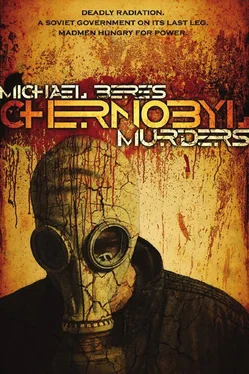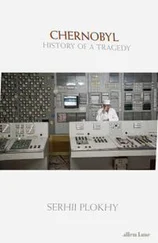Michael Beres - Chernobyl Murders
Здесь есть возможность читать онлайн «Michael Beres - Chernobyl Murders» весь текст электронной книги совершенно бесплатно (целиком полную версию без сокращений). В некоторых случаях можно слушать аудио, скачать через торрент в формате fb2 и присутствует краткое содержание. Жанр: Триллер, на английском языке. Описание произведения, (предисловие) а так же отзывы посетителей доступны на портале библиотеки ЛибКат.
- Название:Chernobyl Murders
- Автор:
- Жанр:
- Год:неизвестен
- ISBN:нет данных
- Рейтинг книги:4 / 5. Голосов: 1
-
Избранное:Добавить в избранное
- Отзывы:
-
Ваша оценка:
- 80
- 1
- 2
- 3
- 4
- 5
Chernobyl Murders: краткое содержание, описание и аннотация
Предлагаем к чтению аннотацию, описание, краткое содержание или предисловие (зависит от того, что написал сам автор книги «Chernobyl Murders»). Если вы не нашли необходимую информацию о книге — напишите в комментариях, мы постараемся отыскать её.
Chernobyl Murders — читать онлайн бесплатно полную книгу (весь текст) целиком
Ниже представлен текст книги, разбитый по страницам. Система сохранения места последней прочитанной страницы, позволяет с удобством читать онлайн бесплатно книгу «Chernobyl Murders», без необходимости каждый раз заново искать на чём Вы остановились. Поставьте закладку, и сможете в любой момент перейти на страницу, на которой закончили чтение.
Интервал:
Закладка:
“I can’t tell if you’re melancholy from the music or simply relaxed,” said Tamara.
“Relaxed,” said Lazlo.
“The last time we were together you acted this way. Initially you measure our time together with a stopwatch. This morning I expected Olympic judges to rush in and tell us we were late for the gold-medal ceremony.”
“It’s my bachelor life,” said Lazlo. “Our first time together after so long makes me act like a boy on his first encounter.”
Tamara touched her chest above her breasts. “Some boy. Last night you seemed a dozen boys making up for lost time.”
“How do you put up with me?”
“I know you,” said Tamara. “I enjoy our seasonal visits. But you should see other women, Lazlo. Life is too short to wait for what you want.”
“What do I want?”
Tamara laughed. “Like me, you don’t know what you want. We are urban Gypsies, you and I. Instead of traveling from one place to another, we stay in one place. But we still have the need to roam. So we let our desires roam. What do you think, Laz? Is it a good theory?”
“The best I’ve heard.”
“Did you ever come close to marriage?”
The candle on the table reminded Lazlo of church, of candlelight glowing on perspiring faces, of the wedding of Mihaly and Nina. “The closest I ever came to marriage was when I was best man for my brother’s wedding.”
Tamara laughed. “You are a strange man. You fill your life with melancholy. Militia work is like many of our ministries. Gloomy places. The gloominess overflows even into the streets and parks where babushkas sweep sidewalks and watch for unjustified laughter.
But here in your home, you are supposed to shed your gloominess.”
“There must be times when I’m cheerful. I simply don’t show it.”
“Are there times you are able to forget the boy on the Romanian border?”
Lazlo stared into Tamara’s dark eyes. “When I’m with you, of course.”
“I’m serious. Think about it. When are you truly happy?”
He stared into Tamara’s eyes and thought about it.
“Listen to Lakatos on the violin. The way each note stretches to its limit as if he’s reluctant to let go and face silence. Call it melancholy, or blame the incident on the Romanian border. But it’s more complicated. Tonight, for some reason, the silence at the end of the song seems closer.”
Tamara’s eyes glistened in the light of the candle as she stared at him. They stayed this way for several minutes, holding hands and staring as if they could read one another’s thoughts.
Then Tamara blew out the candle and led Lazlo past the phonograph where the violin of Lakatos cried in the darkness. They danced, swayed in one another’s arms until the record was over.
They went into the bedroom where the breeze from the south made the sheets cool and moist and fragrant.
After dark, with windows and even the space beneath the door sealed with damp towels, it was impossible to tell what the weather was like outside. The apartment was warm and stuffy. From her bed Juli saw Marina outlined against the faint glow of night light from the patio door.
“Are candles still lit in windows?” asked Juli.
“Yes,” said Marina. “It reminds me of Christmas.”
“Can you see smoke?”
“No. The sky is too dark.”
“I wonder if it’s still burning.”
“If so, it can’t be as bad as this morning when we could see the glow of flames.” Marina let the parted curtains close and sat on the edge of Juli’s bed. “It’s so quiet. Everyone who has a car has probably left. Do you think it’s still dangerous to be outside?”
Juli touched the dosimeter on the night table. “I looked a few minutes ago. It’s going up about a millirem every hour. Outside it must be higher.”
“Should we shower again?”
“No. Save the water in the tub.” Juli sat up, put her arm about Marina’s shoulder. “Save it for Vasily and his mother and sister because the water pressure is dropping. They’ll be here, Marina.
Vasily knows how to take care.”
There was a rapid hammering above, which grew louder and louder.
“Another helicopter,” said Marina.
“They’re dumping something onto the fire,” said Juli. “At least something is being done.”
Suddenly there was a pounding at the door. Marina lit a candle.
“It must be Vasily.”
But it was not Vasily. It was one of the women from the courtyard. The woman who had assured tenants the church would not burn palms before Palm Sunday. Instead of wearing nightclothes, the woman wore slacks, boots, a coat, and a head scarf.
She looked past Marina to Juli. “My name is Svetlana Alexievich.
I have children… I wanted to know if you knew anything more.”
Juli got out of bed and went to the door. “Are the children in your apartment?”
“Now they are. I did as you said last night. I closed the windows and sealed beneath the door. But later in the morning other children were going to school. One of the teachers is in the apartment next door. She said school was open, so everything must be fine. I let the children go, and now I’m worried. They gave the children pills. My other neighbor says there are buses lining up outside the city. She says we’ll all have to leave. She saw the militia station captain driving out of town and said the plant might have been sabotaged. Why would they have school if it were dangerous? My boy says his friends rode their bicycles to the plant to look at the fire. I don’t understand why some say everything is fine, while others…”
“Please listen,” said Juli. “Keep your children inside. If buses come to take us, it’s best to go. It would be temporary, I’m sure. But children, especially, should not be exposed unnecessarily. Did the school give them extra pills?”
“Yes,” said Svetlana. “They take them every three hours. We have enough for two days.”
“Good,” said Juli.
Svetlana stared at the candle Marina was holding and licked her lips. “The air… it smells like my husband’s clothes from the machine works.” She paused, looked about. “My neighbor says some residents are burying money and valuables in case we have to take the buses in a hurry. Why do we have school on Saturday? Simply to be different from America? Always to be different, always to surpass the Americans. So, if the buses come, we should leave?”
Juli stepped closer to Svetlana. “Even if the officials are overreacting, it would be best.”
Svetlana held both Juli’s hands for a moment, then disappeared down the hall.
After closing the door, Juli replaced the wet towel at the opening beneath it, went to the night table, picked up the dosimeter, and held it up to Marina’s candle. When she went into the bathroom and began vigorously washing her hands in the water they had saved in the sink, Marina watched in horror. And when the sound of another helicopter vibrated the glass of the windows, Marina began to cry.
The buses, having waited outside Pripyat, lined up one after another on Lenin Street in the center of town and shut off their engines. A driver with a handkerchief tied over his mouth and nose got out of his bus, ran to the bus ahead, and boarded. This driver also had a handkerchief over his mouth and nose.
“What did he have to say?” asked the driver from the bus behind.
“Who?”
“The soldier with the Kalashnikov who just got off your bus.
You’re first in line, so I thought he might have told you something.”
“He said it’s the end of the world.”
“You are always the comedian, Yuri.”
“He was trying to find out if I knew anything. He said earlier today he caught a bunch of kids who had gone to the station to watch the fire. They were outside the fence. Crazy kids. I asked when we would load up and get the hell out of here. He said he hadn’t gotten the order yet and didn’t know whether it would be tomorrow or the next day. He said we have to wait.”
Читать дальшеИнтервал:
Закладка:
Похожие книги на «Chernobyl Murders»
Представляем Вашему вниманию похожие книги на «Chernobyl Murders» списком для выбора. Мы отобрали схожую по названию и смыслу литературу в надежде предоставить читателям больше вариантов отыскать новые, интересные, ещё непрочитанные произведения.
Обсуждение, отзывы о книге «Chernobyl Murders» и просто собственные мнения читателей. Оставьте ваши комментарии, напишите, что Вы думаете о произведении, его смысле или главных героях. Укажите что конкретно понравилось, а что нет, и почему Вы так считаете.












